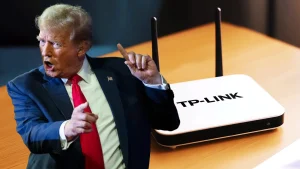China Finally Losing Hope in NVIDIA
A few days ago, NVIDIA’s Tmall flagship store suddenly became empty. While the store and search function remained, all the products for sale mysteriously disappeared.
Clearly, NVIDIA, known for “selling shovels next to a gold mine,” has run into major trouble.
It’s apparent to the discerning eye that this is a chain reaction.
On December 9th, NVIDIA was formally investigated for suspected violations of China’s Anti-Monopoly Law and the Notice on the Anti-Monopoly Review Decision Concerning the Acquisition of Mellanox Technologies Ltd. by NVIDIA Corporation.

Although no official conclusions have been reached, looking back at the origins reveals some clues.
In 2019, NVIDIA acquired Mellanox Technologies, a chip manufacturer specializing in network adapters, switches, software, and chips that significantly boost device interconnectivity speed, enhancing operational efficiency for internet companies and the finance industry.
During its peak in 2015, Mellanox Technologies held an 80% market share in the global InfiniBand market, with even tech giants like Alibaba and Baidu becoming major clients.
In response to this powerful merger, the State Administration for Market Regulation imposed additional restrictive conditions, requiring compliance with certain obligations.
• When selling NVIDIA GPU accelerators and Mellanox high-speed network interconnect devices to the Chinese market, no forced bundling or imposition of unreasonable transaction conditions shall be allowed. Customers must not be hindered or restricted from purchasing or using the aforementioned products separately. Discrimination against customers purchasing these products individually based on service levels, prices, software features, etc., is prohibited.
• Supply NVIDIA GPU accelerators, Mellanox high-speed network interconnect devices, related software, and accessories to the Chinese market based on the principles of fairness, reasonableness, and non-discrimination.
• Ensure the continued interoperability of NVIDIA GPU accelerators with third-party network interconnect devices and Mellanox high-speed network interconnect devices with third-party accelerators.
• Maintain the open-source commitment for Mellanox high-speed network interconnect device point-to-point communication software and collective communication software.
• Implement protective measures for the information of third-party accelerator and network interconnect device manufacturers.
However, it appears that NVIDIA may have violated these commitments during subsequent sales processes.
If the investigation proves true, according to Article 63 of the Anti-Monopoly Law, NVIDIA could face fines of up to $7.8 billion (approximately 57 billion RMB) for particularly severe violations leading to significant consequences.
This isn’t the only antitrust investigation NVIDIA is facing, as actions have already been taken in the US, UK, and France. With China now involved, it seems NVIDIA has offended four of the five permanent members of the UN Security Council, almost rivaling the status of the late Gaddafi.
Despite these challenges, NVIDIA remains firm in its stance, declaring, “NVIDIA prevails with strength!” and expressing willingness to address any regulatory agency’s inquiries regarding their business practices.
NVIDIA’s confidence is backed by their dominant position in the high-end GPU market, where they lead in computing power without any real competition. Their global GPU market share stands at nearly 90%, a validation from users through their purchasing power.

Apart from their core GPU business, NVIDIA has achieved comprehensive domination in the AI industry through ecosystem development and strategic acquisitions, covering everything from software (CUDA) to complementary facilities (network cables).
While their market dominance is undeniable, it is not a license for NVIDIA to set exorbitant prices or engage in coercive bundling practices.
Reports have surfaced stating that NVIDIA earns a whopping 1000% profit margin for each H100GPU sold. Meanwhile, customers struggle under the weight of high markups and supply shortages.
Even Elon Musk, with a net worth of $400 billion, has personally criticized NVIDIA, stating that acquiring NVIDIA GPUs is more challenging than obtaining certain illicit substances!
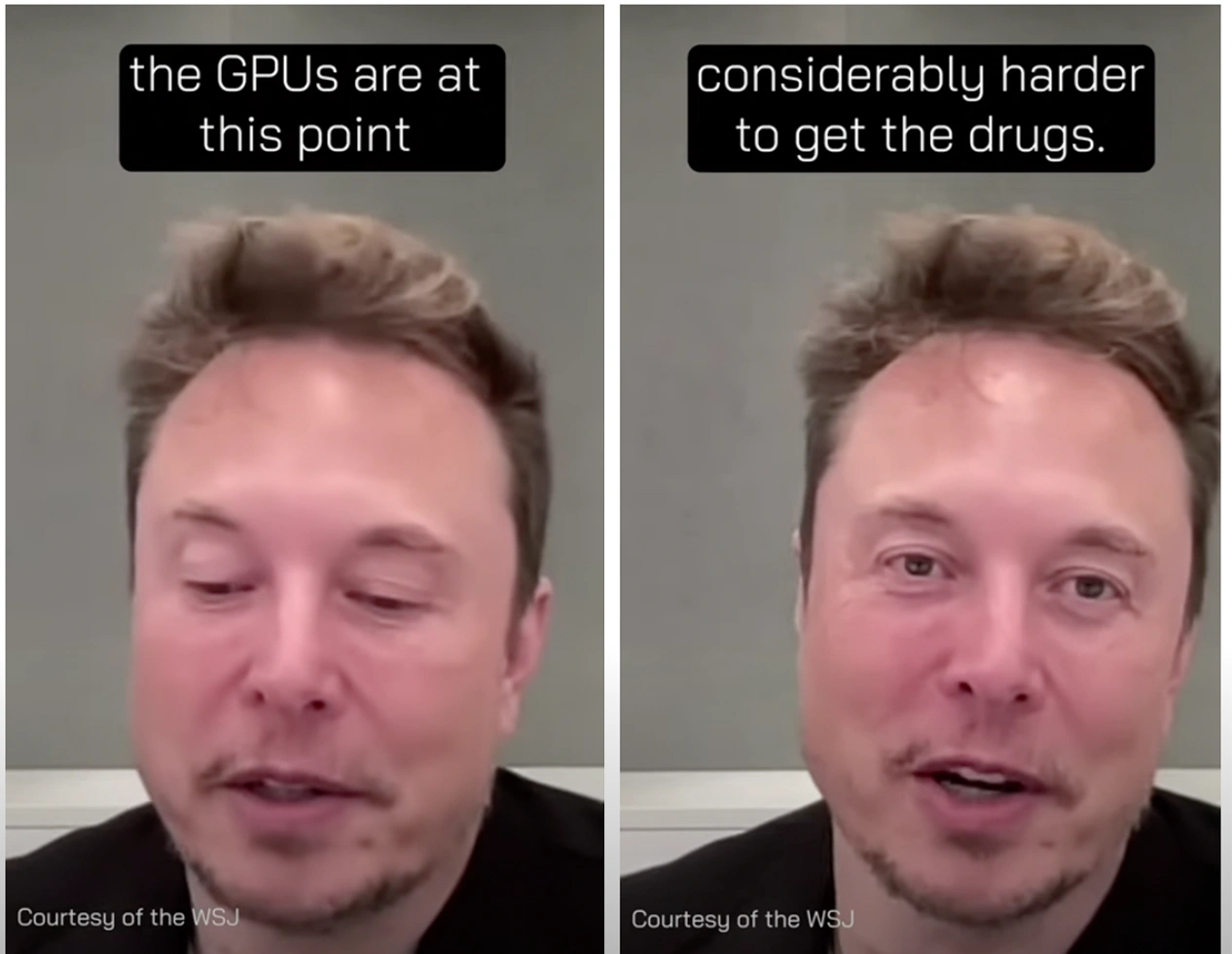
Leveraging these tools of productivity, NVIDIA has amassed a market value exceeding $3 trillion, boasting a staggering gross profit margin of 74.6% in their financial reports, with revenue and profits nearly doubling each quarter.

This time, Moore’s Law failed to continue shining in the chip industry, but instead, it has brought NVIDIA a windfall.
In terms of popularity, NVIDIA has also earned the status of a “global enemy.”
In August this year, NVIDIA first faced an antitrust investigation initiated by the US Department of Justice, followed by scrutiny from the EU anti-monopoly regulatory agency on December 7th, and subsequently, China’s State Administration for Market Regulation also initiated an investigation.
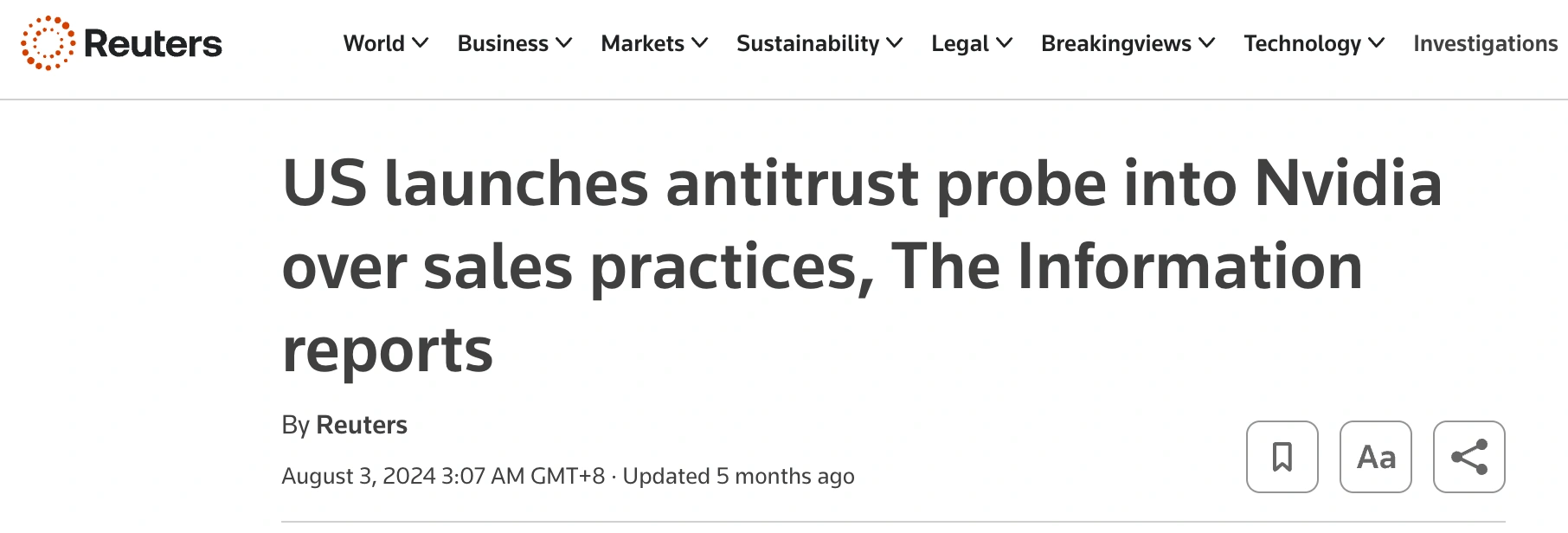
Among the many “victims” NVIDIA is facing, China undoubtedly has the most reason to hold it accountable.
It is widely known that NVIDIA treats the Chinese market differently. Products that are available in other countries are not readily accessible to Chinese companies!
Moreover, NVIDIA’s blatant double standards are a clear violation of the law.
When NVIDIA acquired Mellanox four years ago, the conditions we set included “supplying NVIDIA GPUs to the Chinese market based on the principles of fairness, reasonableness, and non-discrimination.”
Unlike the EU’s imposition of tariffs on Chinese electric vehicles, our investigation into NVIDIA for antitrust violations is not a matter of “taking sides” or promoting local protectionism.
For instance, in a recent draft from the Ministry of Finance, there is a provision stating: “In government procurement, domestic products will receive a 20% price evaluation advantage.”
The so-called domestic products must meet the following three conditions: manufactured within China, with a specified percentage of domestically produced components, and meeting requirements for specific key components and processes.
Those familiar with the international situation may have noticed similarities between this and the US 2022 “Inflation Reduction Act,” which imposes similar restrictions on consumer tax credits for purchasing electric vehicles.
The act specifies that battery components must be mined, processed, and assembled primarily in the US, Canada, Mexico, or countries with free trade agreements with the US.
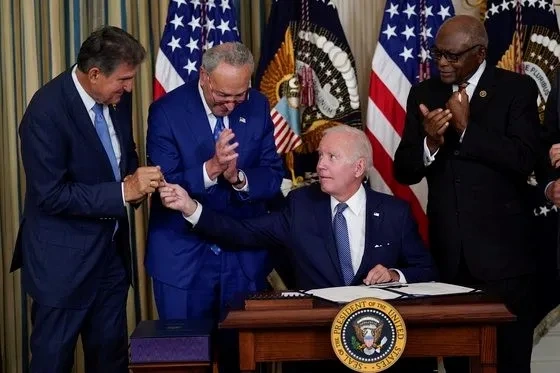
At first glance, our restrictions on “domestic products” seem a bit like crossing the river by feeling our way to America once again.
However, upon closer examination, it becomes clear that it is an entirely different matter.
The US “Inflation Reduction Act” explicitly prohibits the inclusion of battery components assembled or produced by “sensitive foreign entities.” It’s essentially a direct statement against using Chinese batteries.
Even Tesla vehicles manufactured in the US lose out on subsidies if their battery packs are sourced from China.
The “Inflation Reduction Act” applies to consumer purchases, but more stringent restrictions have been implemented for government procurement by the US government.
In the 1933 Buy American Act, federal agencies were required to give preference to products that were “substantially all” mined, produced, or manufactured in the United States, with a specific domestic content requirement of 50%.

In recent years, there have been more detailed strategies specifically targeting Chinese products.
In the field of semiconductors alone:
• In 2019, the US sanctioned Huawei, prohibiting unauthorized American companies from selling products and technology to the company.
• In 2020, any entity (including non-US companies like TSMC) was banned from supplying semiconductor products containing US technology to Huawei.
• In 2022, comprehensive restrictions were announced on selling advanced chips to China.
• In 2023, through “long-arm jurisdiction,” China’s purchase of high-end chips from several dozen third countries was limited.
• In early December of this year, the US announced a new round of semiconductor export controls to China, with 140 Chinese companies listed on the Entity List.
The US sanctions have escalated and intensified, moving from targeting a single company to mobilizing all available resources, gradually…
In our consultation draft, it explicitly states the need to “treat all types of businesses equally”: even foreign enterprises, as long as they are manufactured/assembled domestically and meet a certain level of localization, can be considered “Chinese-made” and enjoy a 20% price discount!
This reveals a strategy to support the industry chain, encouraging competition between Chinese and foreign products. This starkly contrasts with the approach of European and American countries that wield the tariff stick against Chinese electric vehicles.
Indeed, NVIDIA’s differential treatment in the Chinese market may be somewhat “coerced,” given the circumstances of operating in the United States. However, to argue that NVIDIA is innocent would also mean acknowledging the unjust sanctions imposed on Chinese companies like Huawei.
In the face of the trade war instigated by the United States, we will not stand idly by or surrender.
If the US prohibits NVIDIA from selling high-end chips to China, we will also restrict the export of rare metals like gallium, germanium, and antimony to the US. The principle of reciprocity is essential in diplomatic relations.
If one believes that the actions of Europe and America represent the practices of the “civilized world,” then China, following suit in launching an antitrust investigation against NVIDIA after the US and Europe, is aligning with the “civilized world’s” footsteps.
Everything is just getting started.
As trade tensions escalate, the old world order is crumbling.
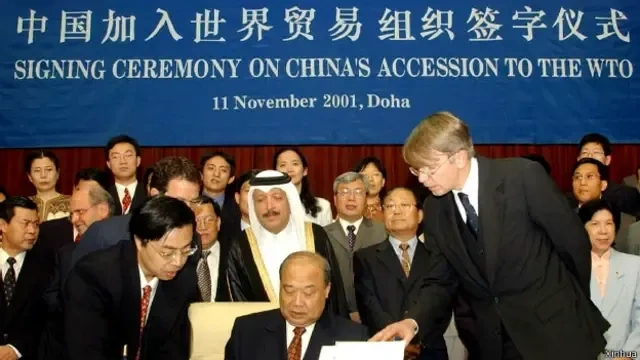
Advocates of the global market and free trade were not wrong; they simply lived in an era when China had just joined the WTO, with fewer restrictions on global capital flows.
However, times have changed. The US began imposing tariffs on Chinese goods in 2018, the UK officially exited the EU in 2020, and the EU is targeting Chinese electric vehicles in 2024.

Those who once established rules are now the first to break them, while we continue to abide by the ethics of the old world for a considerable time.
In this ongoing trade war, we maintain restraint, aiming to lead by example and uphold a fair and just global market order.
As the world’s largest industrial nation, an open market and free trade also benefit us.
When we proclaim that “American chips are no longer secure or reliable” and prepare to procure from the government in this sensitive sector, supporting domestic products in written form, it suggests that the existing market order may be in jeopardy.
Recognize reality, abandon illusions. Believing that friendly development can be achieved simply by adhering to open cooperation is wishful thinking.
The chaotic era of rampant trade protectionism will end when, nobody knows, just as we were not the first to fire the gun.


